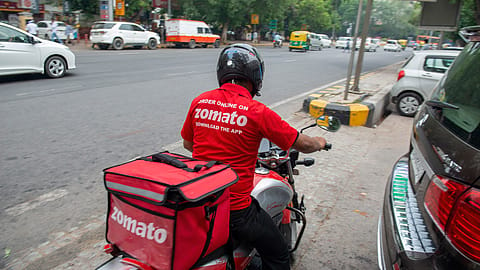Food delivery workers' income drops 11% in 3 years
Monthly incomes of long-shift food delivery workers plunged 11% to ₹11,963 in May 2022 from ₹13,470 in 2019

Food delivery platform workers saw an 11% decline in their average monthly real income between 2019 and 2022 due to inflation and rising fuel costs, according to the National Council of Applied Economic Research (NCAER).
Monthly incomes of long-shift food delivery workers plunged 11% to ₹11,963 in May 2022 from ₹13,470 in 2019, the economic policy think tank says in a study titled 'Socio-economic Impact Assessment of Food Delivery Platform Workers'.
Workers working for 11-hour slots were labelled 'long-shift workers'; this includes wait time between orders and wait time at restaurants to collect orders. Others were 'short-shift workers', who worked for 5 hours, or on weekends, or on special days. The average income of short-shift workers slipped 10% to ₹7,157 in 2022 from ₹7,999 in 2019.
The ability to meet current household expenditure has also gone down for long-shift workers, the NCAER study says. "Long-shift workers were breaking even in 2019 and 2020 but not in 2021 and 2022. As fuel costs and overall inflation started to rise, workers found it increasingly difficult to meet monthly expenditure out of the monthly income earned from the platform," it says, adding that the share of workers having other sources of income was limited.
In comparison to their previous jobs, real incomes (indexed to Consumer Price Index Urban 2011–12) had either increased or remained the same for 65% of the long-shift platform workers and decreased for 35%.
For 23.8% of the workers, the food delivery platform was their first job. Of this group, students form the largest chunk (88%). The majority of workers were below the age of 35.
The study shows that food delivery platforms have led to job creation in Tier 2 and Tier 3 cities, with a majority of the platform workers currently employed in their hometowns. Platform work moves the needle on the formalisation of employment by offering accident insurance and task-based written contracts to all workers, the report says.
Recommended Stories
The study also underscores the critical role played by food delivery platforms during unprecedented events such as the pandemic, when such work also functioned as a shock absorber for workers to offset periods of unemployment.
The study recommends striking a balance between regulating platform work and preserving its inherent flexibility. While emphasising the importance of safeguarding workers' rights, the study stresses the need to preserve the accessibility and convenience that platform work offers.
The report advocates the formal recognition of the skills acquired by platform workers through partnership with the National Skills Development Corporation (NSDC). It also recommends providing better and more streamlined access to healthcare facilities and information for the platform workers to ensure their well-being in the long term.
"In an era characterised by significant economic change, the socio-economic impact assessment of food delivery platforms is vital for policy formulation and informed decision-making," says Bornali Bhandari, professor, NCAER.
(INR CR)